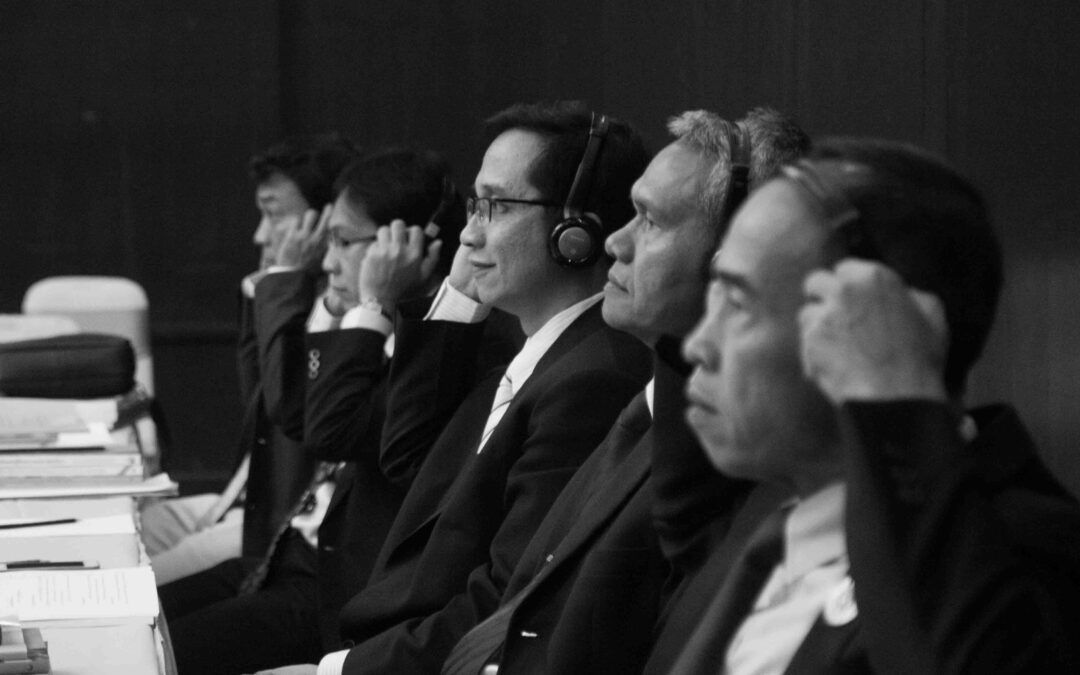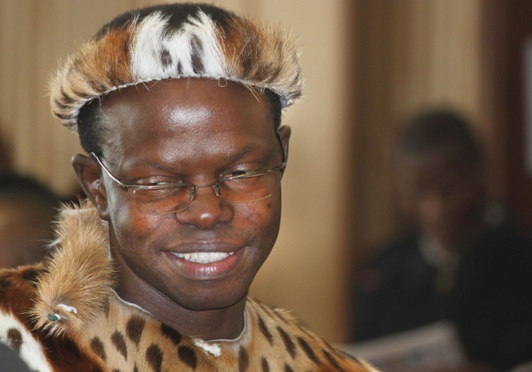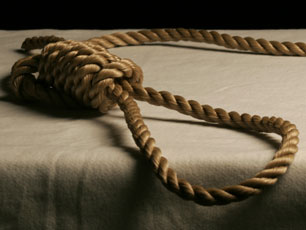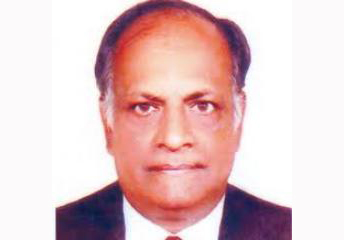
Jul 19, 2015 | News
On 18-19 July 2015, the ICJ held a workshop on “The Protection of Victims in Criminal Cases” for 35 judges in Thailand’s deep South. This is the fifth workshop the ICJ has held with the judges of Region 9 since 2011.
The objective of the workshop, held in Hat Yai, was to discuss how to improve procedural measures to protect victims in Thailand with reference to international law and standards.
Speakers at the workshop included Justice John Lawrence O’Meally, an ICJ Commissioner from Australia, Judge Dol Bunnag, Chief Judge of the Juvenile and Family Court of Sakonnakorn Province, Chief Judges from Region 9, and Marie Guiraud, International Civil Party Lead Co-Lawyer at the Khmer Rouge Tribunal in Cambodia.
Background:
Previous ICJ workshops with the Judges of Region 9 have covered the following topics:
- Rule of Law and Strengthening the Administration of Justice in the Context of the Application of Emergency Laws in the Southern Border Provinces (2011)
- Rule of Law and Strengthening the Administration of Justice in the Context of Bail in the Southern Border Provinces (2012)
- Rule of Law and Strengthening the Administration of Justice in the Context of Habeas Corpus in the Southern Border Provinces (2012)
- The Principle of Inadmissibility of Evidence Obtained by Unlawful Means and Hearsay Evidence: International Standards Compared to Thai Law (2014)

Jun 10, 2015 | News
The ICJ today welcomed the opinion by The United Nations Working Group on Arbitrary Detention (UNWGAD) condemning as arbitrary the detention of prominent human rights lawyer Thulani Maseko and calling on the Government of Swaziland to ensure his immediate release.

May 15, 2015 | News
Today the ICJ is launching an EU funded project to contribute to an improvement in administration of justice in Zimbabwe.
It is hoped that it will also result in greater legal protection of human rights as enshrined in the new constitution of Zimbabwe and to meet Zimbabwe’s international legal obligations pursuant to UN and African Union treaties to which it is Party.
Some of the activities that will be carried out under this project include:
– Organising judicial symposia;
– Working towards the re-establishment of the Zimbabwe Judicial College;
– Organising training workshops for non-judicial court staff;
– Organising training for prosecutors, magistrates and lawyers;
– Working for the full implementation of international human rights and rule of law standards as they relate to the administration of justice, including the ACHPR Principles and Guidelines on the Right to a Fair Trial and UN Basic Principles on the Independence of the Judiciary and UN Basic Principles on the Role of Lawyers;
– Working with the Law Society of Zimbabwe to improve the professional integrity of legal practitioners; and
– Supporting the revision of Zimbabwe’s Court Rules.
Speeches:
Zimbabwe-Speech Com Chinhengo-Advocacy-2015-ENG (ICJ Commissioner Chinhengo)
Zimbabwe-Speech CJ GG Chidyausiku-Advocacy-2015-ENG (Chief Justice Chidyausiku)
Zimbabwe-Speech EU Ambassador-Advocacy-2015-ENG (EU Ambassador)

Mar 12, 2015 | News
Pakistan’s decision to fully reinstate the death penalty puts at imminent risk of execution more than 500 people on death row who have exhausted all avenues of appeal, with another 8000 facing death penalties, said the ICJ today.
“The total abandonment of the moratorium on the death penalty is a disaster for human rights in Pakistan,” said Sam Zarifi, ICJ’s Asia director. “We fear a major acceleration in the flow of executions we have seen over the past few months—none of which do anything to protect the rights of the Pakistani people.”
25 people have been executed since 16 December 2014, when Pakistan lifted a moratorium on executions in cases of capital punishment related to terrorism. The decision to partially lift a six-year unofficial moratorium on executions was in response to an attack on a school in Peshawar, killing 150 people, almost all of them children. Pakistan Tehreek-e-Taliban claimed responsibility for the attack.
In January, Pakistan also amended the Constitution and the Army Act, 1952, empowering military courts to try civilians for terrorism related offences.
“The Pakistani people face a very real threat from terrorist attacks, but there is no indication that the death penalty will decrease this threat,” said Zarifi. “Instead, the government is targeting hundreds of people on death row whose convictions had nothing to do with terrorism-related offenses.”
In Pakistan, capital punishment is prescribed for 27 different offences, including blasphemy, sexual intercourse outside of marriage, kidnapping or abduction, rape, assault on the modesty of women and the stripping of women’s clothes, smuggling of drugs, arms trading and sabotage of the railway system. Many of these crimes do not meet the threshold of ‘most serious crimes’ stipulated by Article 6 of the International Covenant on Civil and Political Rights (ICCPR).
Pakistan ratified the ICCPR in 2010. Article 6 of the ICCPR, guaranteeing the right to life, requires that states restrict capital punishment to only the ‘most serious crimes’. The UN Special Rapporteur on extrajudicial, summary or arbitrary executions has clarified that in the context of the death penalty, the definition of the ‘most serious crimes’ is limited to those cases in which there was an intention to kill, which resulted in the loss of life.
In December 2014, the UN General Assembly adopted a resolution, that emphasizes that that the use of the death penalty undermines human dignity and that calls on countries that maintain the death penalty to establish a moratorium on its use with a view to its abolition. An overwhelming majority of 117 UN Member States voted in favor of the call for a worldwide moratorium on executions, as a step towards abolition of the death penalty.
Pakistan should reinstate a moratorium on the death penalty, with a view to definitively abolishing the practice in law,” said Zarifi.
ICJ opposes capital punishment in all cases without exception. The death penalty constitutes a violation of the right to life and the right not to be subjected to cruel, inhuman or degrading punishment.
Contact
Sam Zarifi, ICJ Asia Pacific Regional Director (Bangkok), t: +66 807819002; email: sam.zarifi(a)icj.org
Reema Omer, ICJ International Legal Advisor for Pakistan (London), t: +447889565691; email: reema.omer(a)icj.org

Nov 25, 2014 | Advocacy, Analysis briefs, News
Bangladesh must immediately launch a thorough investigation into alleged attacks on a prominent human rights lawyer, the ICJ said today. The government appears to have taken no real action in the year since the events.
Rabindra Ghosh (photo), advocate at the Supreme Court of Bangladesh and President of the non-governmental organization Bangladesh Minority Watch, has made credible allegations that he was subjected to acts of violence, intimidation and other interference with his functioning as a lawyer.
”The authorities in Bangladesh seem not to have taken Rabindra Ghosh’s allegations seriously, in breach of international standards,” said Matt Pollard, head of ICJ’s Centre for the Independence of Judges and Lawyers. “In addition to his complaints, our own letters to the authorities simply went unanswered.”
Rabindra Ghosh, among other incidents, alleges that he was physically attacked by six of his peers on 25 November 2013, while he was at work in the Gopalgonj District Court.
He further alleges that on 14 January 2014 he was subjected to physical violence, threats, and verbal abuse at the hands of police officers.
He reports that there has been no substantive investigation of his complaints and that he has received no response from the responsible authorities.
“Lawyers play an essential role in protecting human rights and the proper administration of justice,” Pollard added. “International standards require State authorities to prevent attacks and harassment of lawyers and to take effective measures to protect their security.”
The ICJ requested the Prime Minister, the Ministry of Law, Justice and Parliamentary Affairs, the Ministry of Home Affairs and the President of the Bar Association to provide further information and a response to these allegations, but has received no response.
In addition to its call on the authorities of Bangladesh to immediately launch a thorough and independent investigation of the allegations made by Rabindra Ghosh, the ICJ calls on the authorities to take concrete measures to ensure that he and other lawyers are able to discharge their professional duties without any interference or intimidation of any kind. If the investigation confirms the allegations, those responsible must be held accountable.
“The ICJ has observed a general erosion of the rule of law and respect for the ability of lawyers to carry out their duties in Bangladesh,” said Pollard. “Lawyers play a crucial role in ensuring that people whose rights have been violated can demand their right to a remedy. When lawyers themselves become victims simply for carrying out their work, it signals a serious problem for the legal system.”
Rabindra Ghosh’s allegations come against the backdrop of a series of recent attacks on human rights defenders in Bangladesh, including among others the harassment of human rights defenders including Adilur Rahman Khan, secretary of Odhikar; the promulgation of a constitutional amendment that empowers the Parliament to impeach Supreme Court judges; and the amendment of the Information and Communication Technology Act, which is being used to assault freedom of expression and freedom from arbitrary detention.
Contact:
Matt Pollard, ICJ Senior Legal Adviser, +41 22 979 3812, matt.pollard(a)icj.org
A brief background note on the case is available here in PDF:
Bangladesh-Ghosh backgrounder-Advocacy-2014-ENG









